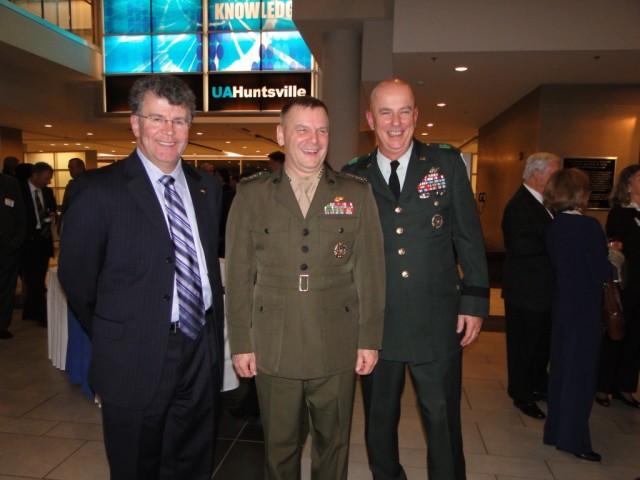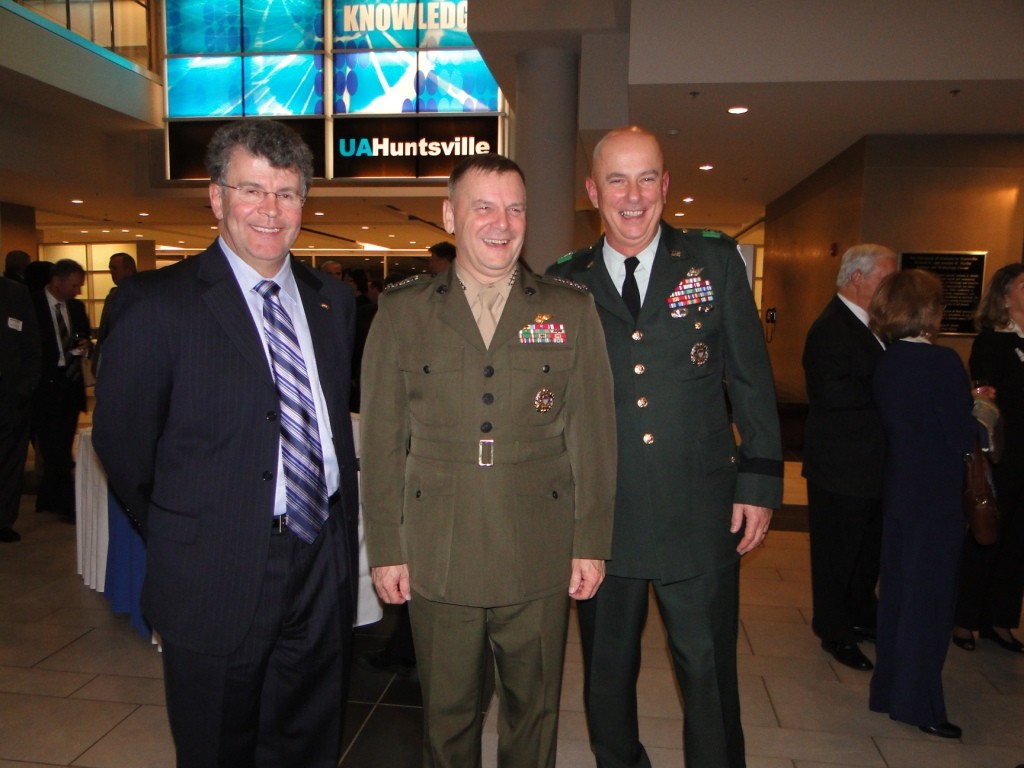
During a question-and-answer session, Joint Chiefs of Staff vice chairman Gen. James Cartwright was asked a question that cut to the heart of America's concerns related to overseas contingency operations - What have you, general, advised President Barack Obama concerning the future war effort in Afghanistan'
The question, asked by Marine reservist Staff Sgt. Jeff Moran, a student at the University of Alabama-Huntsville where Cartwright made a presentation as part of a new distinguished speaker series, gave the Marine Corps general an opportunity to provide a glimpse into the relationship the nation's Joint Chiefs of Staff have with the president.
Although he declined to give specifics of his private conversations with President Obama, Cartwright did tell his audience of local community, business and military leaders as well as UAH students at the Oct. 27 gathering at the Shelby Center that any recommendations must be considered in a global context.
"We all know things change and war is an engagement in a constantly evolving fight," he answered. "Our number one priority is to stop nations out there with weapons of mass destruction that can fundamentally change our way of life. The second priority is to eliminate extremist groups out there who want to fundamentally change our way of life. Those have to be gotten rid of. They cannot be given sanctuary."
In both Afghanistan and Iraq, there is a need to establish a government that can govern, that has sovereignty, and that can defend its borders and take care of conflicts, he said. Once those governments have been established, the U.S. must decide "how much of our treasure do we want to invest so that these countries can defend themselves' This is the great question of this country," Cartwright said.
That quest could take tens of years in Afghanistan, where literacy is at 1 percent and the economy can be measured in millions, not hundreds of millions. It is a country that the U.S. is morally obligated, to some extent, to assist, and yet it is a country that does not have the capacity to ever experience the economic, educational, social and political success of the U.S. Afghanistan, as well as Iraq, is a country that the U.S. "can never buy up to be like us," Cartwright said.
Yet, the U.S. must address the problems of Afghanistan as they relate to the U.S. and the rest of the world, he said.
"What do we want to accomplish and what do we want to do to ensure weapons of mass destruction can't be produced and come back and get us, and extremists won't raise up and come back and get us' This deserves the time and effort to think our way through it, in a deliberate way, and in a way that is representative of this nation and not a particular individual interest," the general said.
"First thing is to make sure you've eliminated WMD (weapons of mass destruction). Second, make sure you've eliminated an extremist threat that could come in here and do another 9/11. Once you've done that, then how much do you want to do to make sure that does not re-occur'"
In the end, the questions will be answered, yet maybe not as quickly as some would like.
"There's no reason to rush to judgment of this given the human treasure we put up against this activity," Cartwright said. "Each level of command structure looks at this from a different set of boots. Though the debate can be divisive, in the end we are better for the debate."
The general then took the question further to address his appreciation for Americans who serve in the military.
"Because of the time we've been in conflict, we're raising a very different generation" of Americans who have their own definition of what is important and what it means to serve, he said.
"The Americans who make that decision to serve are going to run this country," Cartwright said. "They have invested in a way that many have not. They're going to run this place and they are going to have a say in how this country is going to be run.
"They will knock your socks off. We can argue about the direction this country is going, but we can never argue about their contribution."
During his prepared speech, Cartwright focused his comments on the national and global transition from an industrial society to an information society, and the impact that transition will have on the nation's future weapons, and on global relationships. He said the cycle time of competitive advantage in war has shrunk, making it both challenging and costly for the U.S. to maintain its superiority on the battlefield. When designing and building the next aircraft, ship or spacecraft, questions about its relevance to the war fight must be addressed for its lifespan of 15 to 30 years.
"What is it we're going to build that will take competitive advantage ... and what does it mean for the people who use it'" he asked.
The costs savings of technology can be measured by comparing the F-22 aircraft to an unmanned aerial vehicle. How long can they stay airborne without refueling' Three hours for the F-22 versus 24 hours for the UAV. How much does fuel cost per hour to fly' $6,000 an hour versus $20 an hour.
"That's fundamental leverage ... When you take the person out of the vehicle, it's incredible," Cartwright said. "And the machines can do so much more without the human in the loop. They give us such a competitive edge. It will be culture, more than anything, that will slow us down and keep us from a competitive edge."
Cost and the length of manufacturing time will factor into the nation's future competitive advantage on the battlefield. Although quality is important, Cartwright said "we are working ourselves into irrelevance" if we can't build quantity.
The expense and time factor of the next generation aircraft or ground vehicle could very well make them prohibitive.
"Can we somehow afford more than five or six and can we build them before 2020'" Cartwright asked. "They will be irrelevant before they leave the design table. They will offer no competitive advantage. We have to figure out how to change that. We spend much of our time building a platform to defend against a threat. But we need to make that platform useful against real (and multiple) threats."
Although Cartwright predicted that unmanned machines will have a higher profile in the future fight, he also said that the human element is essential because there is "still an art to war" where humans can use computers to understand intent and predict capability.
"We have to address what we build as we go forward in the future ... In terms of ballistic missile defense, how do we put together a missile defense construct for the world that will last two decades' How do we network together all the pieces that give capability and adaptability that is far more agile than any adversary' We need a system that is agile, that no matter where we go we will be ahead of the adversary," the general said.
Computers can go far in networking together the various space, air and terrestrial capabilities. Processing power and data will provide the U.S. with the leverage it needs to make a difference on the battlefield and in the quest for world peace, he said.

Social Sharing